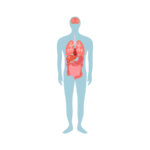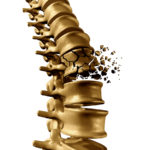By David Blyweiss, M.D., Advanced Natural Wellness
December 25, 2013
- This is no laughing matter
- What happens in your mouth doesn’t stay there
- Brush, floss, rinse and…
Do you remember when you were a kid and your parents would invite all sorts of strangers over for holiday events?
Well I certainly do – and there was this one guy that used to show up at our house every now and then. I remember him well, because he had this little trick that always sent everyone into roars of laughter.
You see, this fellow would loosen his dentures and make them look they were falling out of his mouth. Then he would swiftly suck them back in. He did this over and over again.
Everyone thought it was the most hilarious thing they had ever seen. But these days I no longer see the humor in it.
The poor guy had no teeth! He had lost all of them to some sort of tooth decay or gum infection.
Even worse, this man was a wreck. I remember him talking about a heart problem… and he was riddled with arthritis.
Back then, nobody would have guessed his health issues might have stemmed from gum disease or poor dental health. And if anyone had even suggested it, they would have been ridiculed to no end.
MD Exposes the Hidden Danger to Your Eyes

When your eyesight starts to fail, it's a real problem. Suddenly you can't go to the grocery store... you can't get to the doctor if you have an emergency... you can't meet your friends for dinner…
Your "regular" doctor doesn't have time to keep up with the latest research. And the same goes for eye doctors. They go to school to learn how to fit you for glasses and contacts, but have no way of preventing the damage and loss of eyesight that threatens your freedom and independence.
Let me show you something that explains a LOT about how your eyes work.
In my FREE Special Report, I'll show you a HUGE, untapped resource for your eyes that safely and naturally restores clear, effortless eyesight.
Click here to get started...
But today we know better.
It’s no secret that dental plaque, oral bacteria and gum disease can affect your heart health. For many years now we’ve known about the link between what’s happening in your mouth and your risk of heart disease.
It all starts off with a buildup of dental plaque. You might think plaque only affects your teeth, but it’s also what causes gingivitis and gum disease.
When the plaque and bacteria escape into your bloodstream, it can damage blood vessels, contribute to the buildup of arterial plaque and even result in blood clots.
Worse, gum disease is a source of chronic inflammation that spreads throughout your body. If you’ve been keeping up with my news articles, you know inflammation is a key factor in heart disease.
What you may not realize is the role your teeth and gums might play in other areas of your health.
If you’re one of those people who rushes through your tooth brushing ritual, or who puts off dental care altogether, it may be time to get serious about your oral health. Because it’s not only your heart that’s at risk.
Just take a look at this…
Dementia and memory loss. If you forgot to brush your teeth today it could… well… make you more forgetful.
As it turns out, irregular brushing habits increase your risk of dementia. And to top it off, the worse your oral health is, the more likely it is that you’ll lose brainpower as you age.
One of the key culprits here is gingivitis. Surprisingly, bacteria associated with gingivitis have even been found in the brain tissue of people suffering Alzheimer’s disease. The link is strong enough that today some experts are saying gingivitis might actually be able to predict your risk of future mental decline.
The World's Quickest Solution for Ending Prostate and Urinary Misery
This has recently been revealed to be one of the only real breakthroughs in prostate health.
The seeds of a strange fruit (sometimes called "Chinese Apples") hold powerful phytonutrients that are a revolution in prostate health.
In fact, UCLA and Veterans Administration research have now proved this to be true.
Not only that, but it may be the worlds quickest solution for ending prostate misery.
Simply stated, these phytonutrients represent a huge step beyond beta sitosterol, saw palmetto, and other phytosterols alone.
Simply click HERE if you want to have fast prostate relief...restful, uninterrupted sleep...no more constant "urges to go"...enhanced virility...and optimal prostate support for life.
But memory isn’t the only thing affected.
Painful joints and arthritis. I don’t know anyone who wakes up and says “Gee, I have to brush my teeth to make sure I don’t get arthritis.” But maybe it’s time we start.
You see, there’s something interesting that happens when you have bad oral health or gingivitis. As unusual as it may sound, the DNA from dental gingivitis gets into your synovial fluid. (That’s the fluid that surrounds your joints and prevents friction when you move.)
Now here’s the thing. Once your synovial membrane becomes inflamed, it results in swelling, pain, stiffness and yes! Even arthritis.
Worse, the more oral problems you have the more joints will be affected.
But there’s a more personal issue to which oral health has been linked.
Erectile Dysfunction. Here’s a startling bit of news for you men out there. It turns out gum inflammation might be affecting your bedroom performance.
Awhile back I read a small study that showed more than half of men with erectile dysfunction (ED) had severe gum disease. However, the instance of gum disease in men without ED was relatively small.
Now, this may sound like an odd connection, but it makes perfect sense. Remember… erectile problems are caused by poor blood flow to the penis. And if dental plaque and oral bacteria are damaging your arteries, it’s going to reduce blood flow to the genital region.
And you men know what happens when you can’t get the juices flowing… a whole lot of nothing!
Now it’s not hard to take care of your teeth. And when you do, you can ward off all sorts of health problems as you age. Here’s what it takes…
Brush your teeth for two minutes twice a day. Today everyone is in a hurry. They run the toothbrush over the teeth for 10 or 20 seconds and they’re done. But that’s not enough to defeat the bacteria in your mouth.
Two minutes of brushing with a soft, small-headed toothbrush will clear out most of the bacteria and debris that cause plaque build-up and gingivitis.
Also, for the most benefit, I suggest using a natural toothpaste that doesn’t contain fluoride.
Always floss AFTER brushing. There are many places between the teeth that your toothbrush misses. So flossing is an important part of your daily oral care. But if you floss before you brush, you’ll end up pushing bacteria down into your gums. And your toothbrush can’t reach into those hidden nooks and crannies. So brush first, then floss.
Rinse with a natural mouthwash. Rinsing is an important part of your daily oral regimen. But I’m not crazy about commercial mouthwashes that can be acidic or contain alcohol. Instead, I suggest opting for a natural, herbal-based dental rinse. Look for products that do not contain fluoride, alcohol or saccharin.
And don’t forget, eating at a diet rich in calcium and phosphorous including plenty of dark, leafy greens, nuts, and fish, only helps keep your teeth strong.
Practicing these healthy oral habits can go a long way in both your teeth and your long-term health. So brush, floss, rinse… and make sure to schedule regular cleanings and check-ups with your dentist.
Resources:
Reichert S, et al. Detection of oral bacterial DNA in synovial fluid. J Clin Periodontol. 2013 Jun;40(6):591-8. Epub 2013 Mar 28.
Stewart R, Weyant RJ, et al. Adverse oral health and cognitive decline: the health, aging and body composition study. J Am Geriatr Soc. 2013 Feb;61(2):177-84.
Poole S, et al. Determining the presence of periodontopathic virulence factors in short-term postmortem Alzheimer’s disease brain tissue. Alzheimers Dis. 2013 Jan 1;36(4):665-77.
Oğuz F, et al. Is there a relationship between chronic periodontitis and erectile dysfunction? J Sex Med. 2013 Mar;10(3):838-43. Epub 2012 Dec 4






